FADILA Dziria, an Algerian singer whose real name is Fadila Madani
Her life
Madani was born in 1917 in Janan Bait al-Mal, near the African neighborhood of Sayda in Algiers. His father Mahdi Ben Abderrahmane, his mother Fatuma Khalafawi, the sister of his sister-in-law, Qusam and a brother-in-law named Ammar. Since her youth, she was interested in singing and her proximity to Sheikha Yamna bint al-Haj Mahdi was a more important reason.
The beginning of hier career
Her artistic debut was marked by the rebirth of family celebrations, which led her to rehearse and learn later. Was first discovered through a radio program broadcast by Radio Algiers at the time and entitled (of all the arts) to Professor Gilali Haddad, who then composed many songs. In 1930, she married a 30-year-old woman, 13, with a child who did not live long. She was the one who supported and acted within the family. After the death of her husband, she went to Paris in 1935 to organize many concerts, especially for Algerian immigrants. After France’s return at the request of her mother, she turned to singing on the stage, which was led by the famous Mustafa Mustafa Iskandarani Kashkool pianist, and parallel that Marie joined the Fekkai group. His first recording was a CD entitled “The heart of the heart” in Iraq – a coup with an Arab-Andalusian mold. In 1949, joined the group Mohieldin Bhtarzi at his request and the parties Revivre also has a role play through games, including: play what works non-health – the status of women – Othman in China of footmen, in 1954 and in France makes a virtue on the stage of the Paris Opera A collection of his songs as well as songs for Algerian television.
Her work with the Algerian revolution
Did not prevent the work of the virtue of the technical performance of their national duty during the liberation revolution, where the money was collected and sent by the fedayeen to Mujahideen in the mountains to help them buy weapons and ammunition, which was the cause of her husband in prison Serkadji by the colonial authorities, the prison, which was not taken It is only dangerous in the eyes of colonialism, which has witnessed the colonial arrogance during many years. After leaving prison and independence from Algeria, she formed her own musical group.
Her death
She died at her home near the large post office in Algiers on 6 October 1970 and was buried in the train cemetery.




